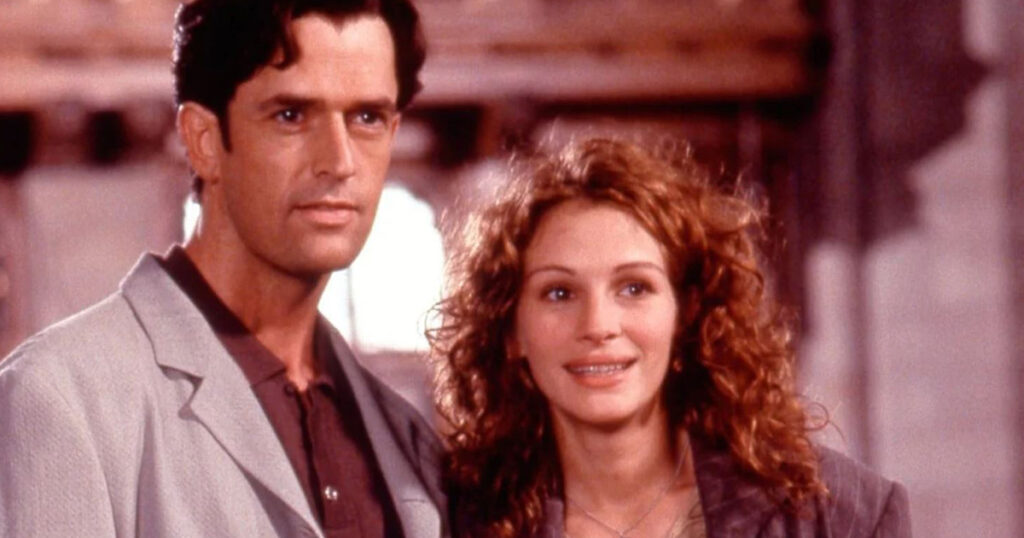[9]
Julia Roberts stars in this devilish romantic comedy from director P.J. Hogan (Muriel’s Wedding) and writer Ronald Bass (Rain Man) about a jealous woman who tries to stop her best friend from marrying another woman. Dermot Mulroney plays the best friend who invites Roberts to join the wedding party. She is quickly adored by the fiancée’s entire family, but that doesn’t detract from her ulterior motive — to drive a wedge between Mulroney and his bubbly, effervescent betrothed, played by a daffy but charming Cameron Diaz.
There are few good romantic comedies made after the 1940s. I’ll go out on a limb and say this is one of the best of them. It’s usually a genre that relies on star-power alone, with rote direction and formulaic writing. But P.J. Hogan proves from the film’s start how cinematic the genre can be, with a widescreen title sequence featuring a bride and her bridesmaids lip-synching and dancing balletically against a pink backdrop to Ani DiFranco’s infectious song, “Wishin’ and Hopin'”. The number serves as a fancy invitation to a movie promising to be more than ‘just another rom-com’. Hogan delivers on that promise, with superb casting, incredible locations and art direction, great songs and scoring, and countless beautiful scene stagings and photographic compositions. It’s simply one of the best-directed romantic comedies in decades.
Julia Roberts brings more than just star-power to the proceedings. She gets to sink her teeth into an acting challenge — to play a selfish, scheming saboteur we can root for. She’s excellent at turning insecurity into charm and spinning sadness into comedy. She and Dermot Mulroney have great chemistry together, but her scenes with supporting player Rupert Everett (An Ideal Husband, Another Country) steal the show. Everett plays her witty, well-mannered gay friend who comforts her in times of need, but isn’t afraid to confront her with cold, hard truths. Some of the film’s funniest moments are between these two characters, especially when Roberts pretends to be engaged to Everett to make Mulroney jealous. When Everett finds out he’s being used for nefarious gain, he plays along to embarrass Roberts as much as humanly possible.
Screenplays rarely contain any scenes that don’t function to move the plot forward. But Ronald Bass’s script here manages to sidestep the tedium of narrative propulsion with more than its fair share of memorable grace notes. When Rupert Everett regales the wedding party at a restaurant with a fictitious, absurd tale of how he and Roberts met, the scene turns into an all-out musical number. The entire cast — even the background extras — end up singing “I Say a Little Prayer for You”. The song does nothing to further the narrative, but the infectious joy of the moment bonds the audience to the entire roster of characters in a way dialogue or other action could never hope to achieve.
In another moment, Roberts sits in a hotel hallway smoking a cigarette, waiting for Mulroney to discover her dark deeds and rip her a new one. A hotel employee comes by, played by none other than pre-famous Paul Giamatti, and tells her smoking isn’t allowed on the floor. He ends up realizing she’s having such a hard time that maybe he should pretend he never saw her smoking. She offers him a puff and he takes it. Then he tells her what his grandmother often said to him: “This, too, shall pass.” Giamatti only appears in this one scene, but leaves a significant impression on the whole film — in a scene that, again, doesn’t further the narrative, yet strengthens our emotional connection with the movie.
Maybe I just prefer my rom-coms with a dark streak, but My Best Friend’s Wedding succeeds for me where other rom-coms fail miserably. It doesn’t try too hard to convince me characters like or love each other — it shows that instead of telling it. The script is refreshing and the actors soar with the material. And P.J. Hogan sends the film over the edge with uncommon skill and style.
With Philip Bosco, Rachel Griffiths, M. Emmet Walsh, and Susan Sullivan.
Oscar Nomination: Best Score (James Newton Howard)

